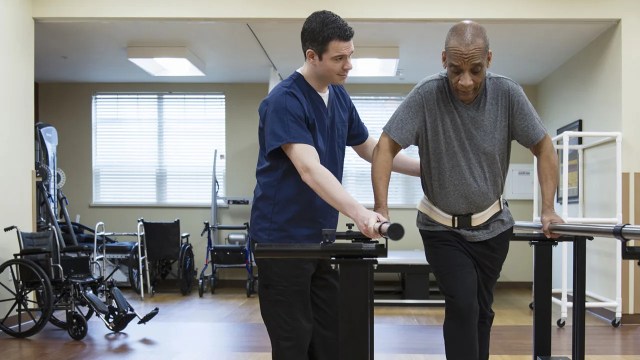
More Black Americans say health outcomes for Black people in the United States have improved over the past 20 years than say outcomes have worsened, according to a 2021 Pew Research Center survey. A majority of Black adults also say that their most recent experiences with the health care system have been positive.
At the same time, though, Black Americans have broad structural concerns about health care in the U.S. and experience disparities in outcomes. For example, mortality rates from cancer and maternal mortality rates are higher among Black Americans than White Americans.
Pew Research Center conducted this analysis to highlight Black Americans’ attitudes about and experiences with health care. We surveyed 14,497 U.S. adults from Nov. 30 to Dec. 12, 2021, including 3,546 Black adults (inclusive of those who identify as single-race, multiracial and Black Hispanic).
The survey was conducted on the Center’s American Trends Panel (ATP) and included an oversample of Black and Hispanic adults from the Ipsos KnowledgePanel. Respondents on both panels are recruited through national, random sampling of residential addresses. This way nearly all U.S. adults have a chance of selection. The survey is weighted to be representative of the U.S. adult population by gender, race, ethnicity, partisan affiliation, education and other categories. Read more about the ATP’s methodology.
Here are the survey questions used for this analysis, along with responses, and its methodology.
This study was informed by a group of advisers with expertise related to Black and Hispanic Americans’ attitudes and experiences in science, health, STEM education and other areas. Pew Research Center remains solely responsible for all aspects of the research, including any errors associated with its products and findings.
Here are five key facts about Black Americans’ attitudes about and experiences with health care, based on the 2021 Center survey:
Black Americans’ recent experiences with the U.S. health care system are mainly positive. About six-in-ten Black adults (61%) say the care they received most recently was either excellent (25%) or very good (36%), and another 25% say it was good. And about half (51%) say their out-of-pocket cost for that care was “about what is fair.”
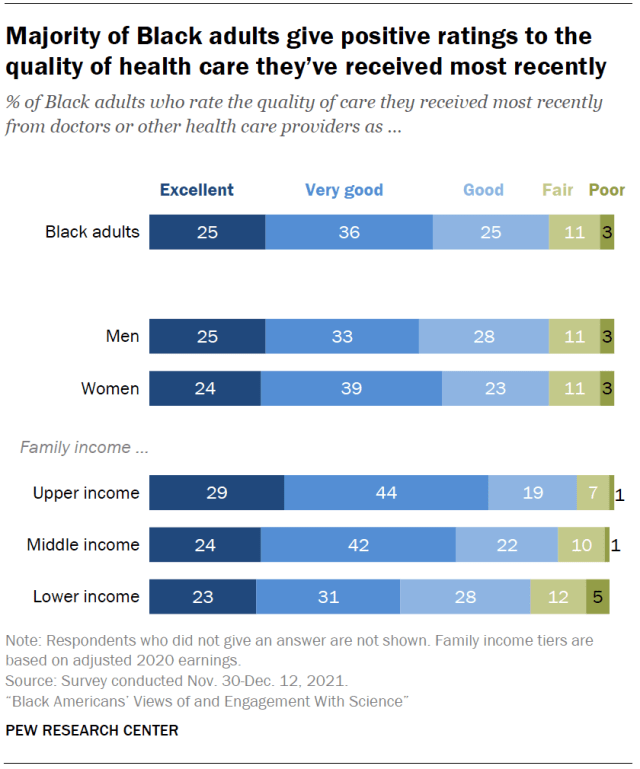
However, these views vary by income. Around three-quarters of upper-income Black adults (73%) describe their most recent care as excellent or very good, compared with 66% of those with middle incomes and 55% of those with lower incomes. And 67% of upper-income Black adults say the out-of-pocket cost of their care was about fair, compared with 46% of Black adults with lower incomes.
Still, a majority of Black adults (55%) say they’ve had at least one negative interaction with doctors or other health care providers. For example, four-in-ten say they have had to speak up to get proper care, making it the most common type of negative interaction we asked about in our 2021 survey. About a third say that their pain has not been taken seriously (35%) or that their provider has rushed them (32%).
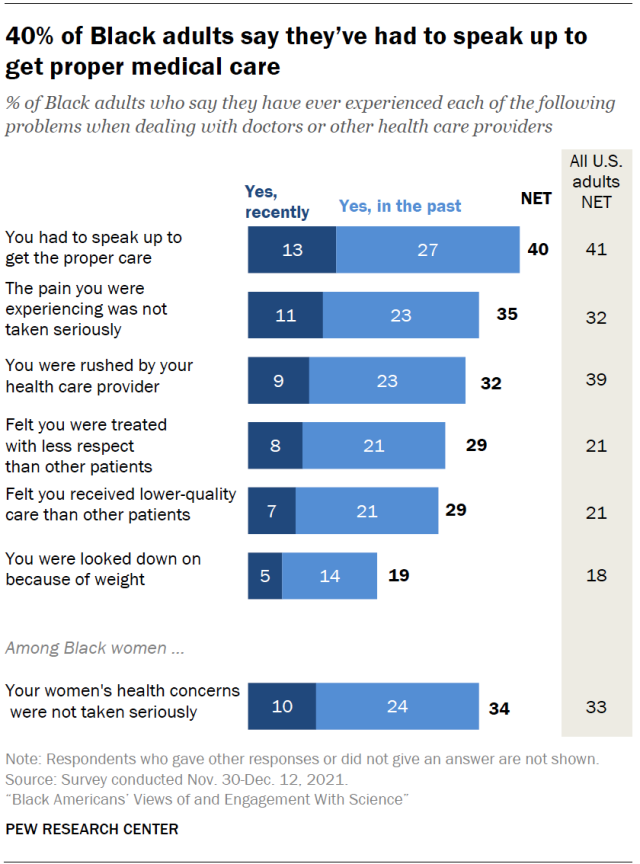
Black Americans’ responses on these questions don’t differ dramatically from those of U.S. adults overall. For instance, 41% of all adults say they have had to speak up to get proper care, and 32% say their pain has not been taken seriously.
Among Black Americans, younger women are the most likely to say they’ve had negative experiences with health care providers. For instance, 52% of Black women ages 18 to 49 say they have had to speak up to get proper care. That compares with 40% of Black women 50 and older, 36% of Black men 50 and older, and 29% of Black men 18 to 49.
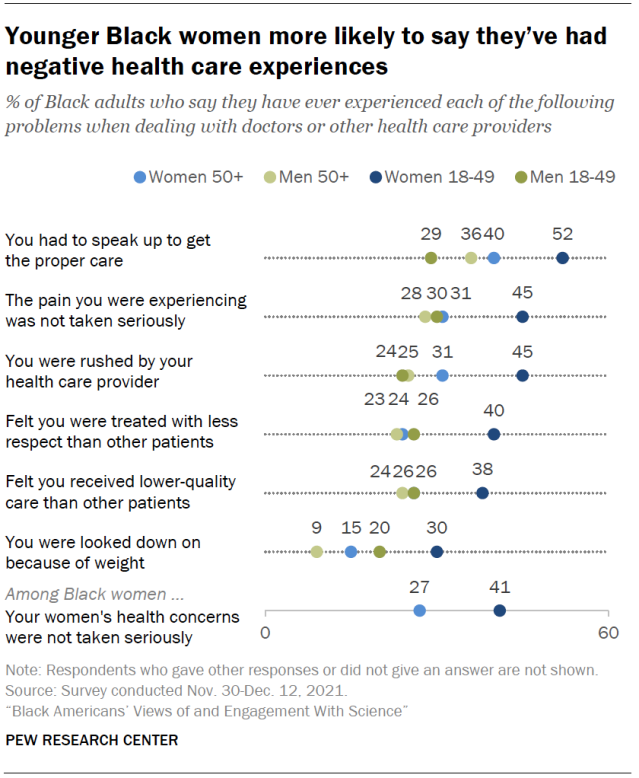
Overall, 71% of Black women ages 18 to 49 say they’ve had at least one negative interaction with a health care provider, compared with 54% of Black women 50 and older, 51% of Black men 50 and older, and 43% of Black men ages 18 to 49. (Women were asked about a total of seven experiences, including one relating to women’s health, while men were asked about six experiences. The differences by age and gender remain when analyzing only the six experiences asked of both men and women.)
Younger Black women are also the most likely to say that they would prefer to see a Black provider and that a Black provider is better than other providers at looking out for their interests and giving them the highest-quality care.
Black Americans cite a lack of access to high-quality medical care as the top reason Black people generally have worse health outcomes than other people. More than six-in-ten Black adults (63%) say having less access to care is a major reason for these disparities, and another 22% say it’s a minor reason. Research has shown that there tend to be fewer primary care physicians, trauma centers, pharmacies and COVID-19 vaccination centers near where Black Americans live.
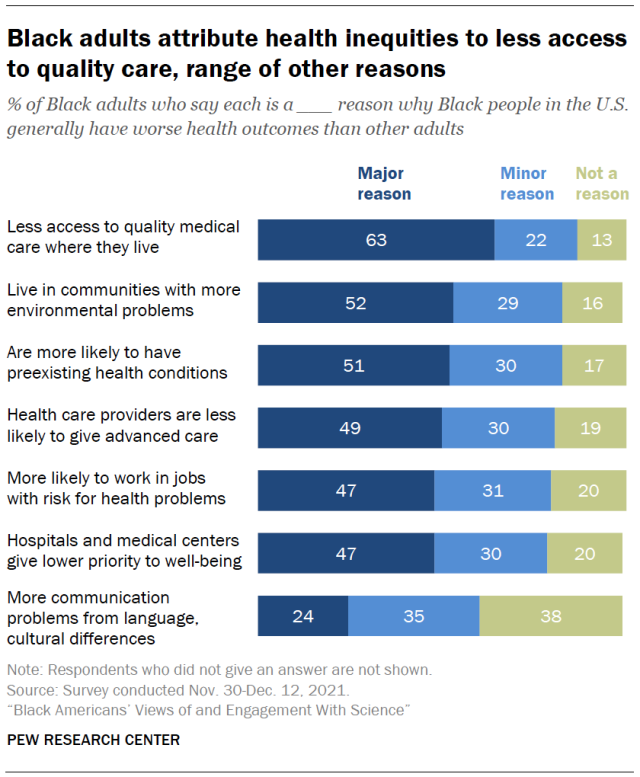
About half or more of Black adults also point to several other factors as major reasons Black Americans tend to experience worse health outcomes. For example, 52% say a major reason is that Black people live in communities with more environmental problems, and 51% say a major reason is that Black people are more likely to have preexisting health conditions.
Black adults with higher levels of education are more likely than those with lower levels of education to identify these and several other factors as major reasons.
Most Black Americans say it doesn’t make a difference to them whether they see a Black health care provider. More than six-in-ten (64%) say this. But 31% would prefer a Black provider, including 14% who would strongly prefer this. Only 4% would prefer not to see a Black provider.
There are no major differences in these views depending on whether Black Americans have seen a Black health care provider in the past. The share of Black adults who prefer a Black health care provider is similar among those who have previously visited one (32%) and those who have not (30%).
However, Black providers are underrepresented in medicine, potentially making it difficult for those who prefer a Black provider to find and book an appointment. Just 5% of physicians and surgeons nationwide are Black, and the same is true for physician assistants. Overall, Black Americans account for about 14% of the nation’s population.
Note: Here are the survey questions used for this analysis, along with responses, and its methodology.

